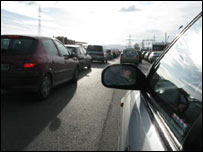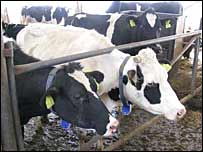|
By Catherine Miller
BBC News, Sofia
|


Sofia could do with some new roads
|
Morning rush-hour in the Bulgarian capital Sofia is a misery.
Traffic grinds along the ring-road, which is riddled with potholes.
Nearby, a new European Union funded motorway is under construction which is supposed to ease the bottlenecks.
But after two officials at Bulgaria's traffic agency were caught taking bribes, the European Union has frozen some of its infrastructure subsidies, including roughly 100 million euros (�79m) for the motorway.
Unless the Bulgarian government is prepared to replace that money, Sofia's commuters will continue to suffer.
Malpractice
Tackling corruption and organised crime was supposed to be a pre-condition for Bulgaria's membership of the EU.
But just over a year after it joined, three streams of EU funding have been suspended because of apparent fraud, and the EU's investigating agency has 45 cases of alleged Bulgarian malpractice on its books.
"Nothing's changed," says Yovo Nikolov, an award-winning investigative reporter for the weekly magazine Kapital.
"If there was a real fight against corruption, you would see more corruption convictions from the courts.
"But the number of people being convicted hasn't changed - it's very low and those that are convicted are junior officials. That shows the authorities aren't tackling it effectively."
Critics have suggested the recent spate of apparent misuse of European funds shows that Bulgaria is backsliding on reform, now that it has jumped the hurdles to win membership of the EU.
But the European Commission warns it is keeping Bulgaria on a short leash.
Powerful threat
"The European Commission is obliged to safeguard the financial interests of all European taxpayers," says the European Commission's Head of Representation in Sofia, Zinaida Zlatanova.
"The Commission decided to suspend the funds so that the Bulgarian authorities will take serious, concrete measures to deal with the issues. And the Commission will do this every time there is even a suspicion of mismanagement."

Bulgaria's farmers fear corruption could threaten EU funding
|
That threat is a powerful one. The European Commission's budget for Bulgaria for 2007-2013 comes to around 9bn euros.
"The signal that was sent was a very strong one," says Assen Arghov, a member of parliament for the opposition Democrats for a Strong Bulgaria.
"People in the European Commission may be bureaucrats but they're very stingy bureaucrats. The Bulgarian authorities are in a panic."
He claims the EU has now suspended so much funding that Bulgaria is paying in more to EU coffers than it gets back - a strange situation for one of the EU's poorest members.
Patience needed
But Maria Anguilieva, an MP from the ruling coalition and the deputy chair of the parliamentary EU affairs committee says Europe needs to be a little more patient.
"I think it's normal one year after accession not to be the best. We are trying to be the best and we've achieved a lot in a very short time," she says.
But in one of Sofia's markets, optimism is wearing thin.
"Corruption is not just an everyday thing, it's an every minute thing," said one lady, selling shiny red tomatoes to shoppers, stopping off on their way home from work.
"Everyone wants money for everything," agreed a lady on a nearby stall. "Anything you want to do, you need to have connections and you need to give bribes."
Benchmarks
The European Union imposed a special corruption monitoring scheme on Bulgaria, and its neighbour Romania, when they joined the EU in January 2007 because it was felt they were not yet up to EU levels.
If Bulgaria does not meet specified benchmarks, the EU can impose what it calls safeguard clauses.
Under one provision, a quarter of the subsidies which Bulgaria's farmers receive can be held back.
That worries Elizabeta Bozilova, who is operations manager on one of Bulgaria's largest dairy farms, just outside the second city, Plovdiv.
Her farm has already received 700,000 euros to help bring the farm up to EU standards. But she fears corruption could jeopardise future funding.
"It's difficult to keep the high standards that are demanded, so the money from the EU is really important," she says.
"I'm angry because the corruption takes place with officials at a higher level, but we are the ones that need the money."
Pressure is growing on the Bulgarian government from farmers, the public, but above all from the EU.
With European public opinion increasingly sceptical about the merits of bringing poor countries like Bulgaria into an enlarged European Union, Brussels needs to prove taxpayers' money is not going down the drain.
|







Bookmark with:
What are these?